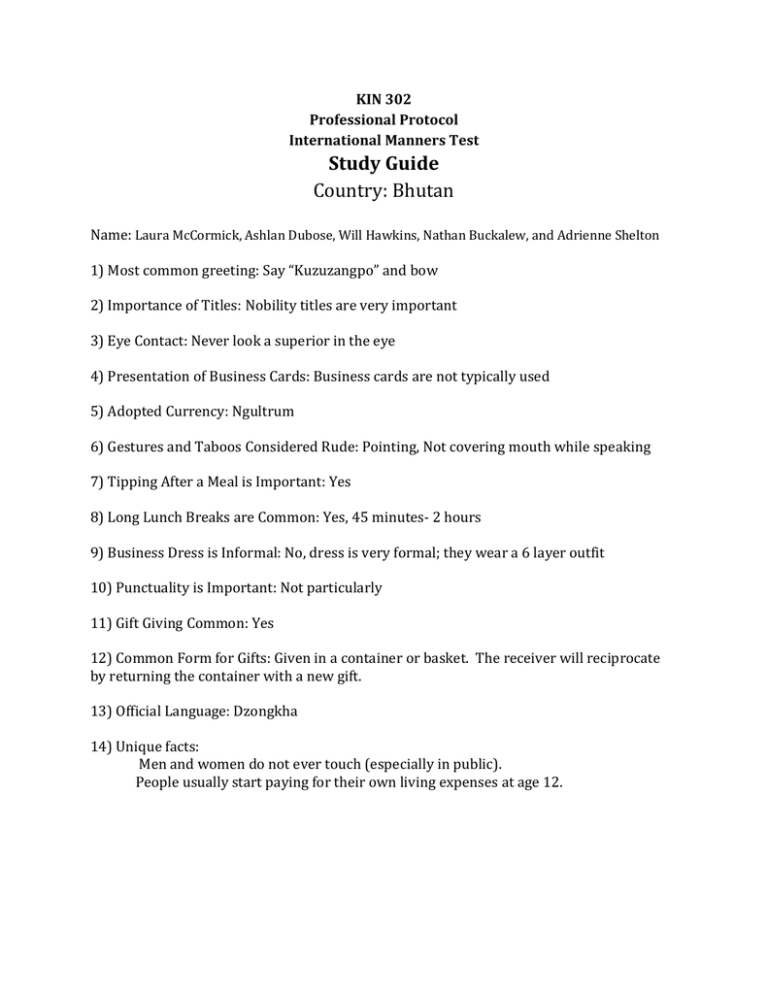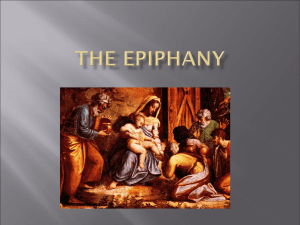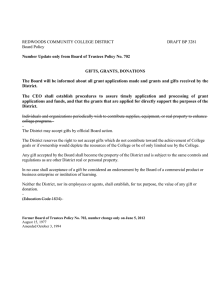Study Guide Country: Bhutan
advertisement

KIN 302 Professional Protocol International Manners Test Study Guide Country: Bhutan Name: Laura McCormick, Ashlan Dubose, Will Hawkins, Nathan Buckalew, and Adrienne Shelton 1) Most common greeting: Say “Kuzuzangpo” and bow 2) Importance of Titles: Nobility titles are very important 3) Eye Contact: Never look a superior in the eye 4) Presentation of Business Cards: Business cards are not typically used 5) Adopted Currency: Ngultrum 6) Gestures and Taboos Considered Rude: Pointing, Not covering mouth while speaking 7) Tipping After a Meal is Important: Yes 8) Long Lunch Breaks are Common: Yes, 45 minutes- 2 hours 9) Business Dress is Informal: No, dress is very formal; they wear a 6 layer outfit 10) Punctuality is Important: Not particularly 11) Gift Giving Common: Yes 12) Common Form for Gifts: Given in a container or basket. The receiver will reciprocate by returning the container with a new gift. 13) Official Language: Dzongkha 14) Unique facts: Men and women do not ever touch (especially in public). People usually start paying for their own living expenses at age 12. Country: Nepal Name: Amber Hollingsworth, Sarah Conway, Terrell Prescott, and Craig Mackay 1. The most common greeting in Nepal is “Namaste” which is hello and goodbye and a bow is polite and should be reciprocated. 2. Titles and surnames are used frequently. 3. Eye contact is important when talking to someone in Nepal. 4. Business cards are common, and should be exchanged with information in Nepali facing on top. 5. The adopted currency in the Rubi. $1.00 = 75 Rubi. 6. When shaking heads our “yes” is their “no” and they have no shake for yes. 7. You should always tip after a meal. 8. Long lunch breaks are not common. 9. Business attire is conservative with suits and ties, but in higher level business the national dress is common in business practices—daura surwal. 10. Punctuality is not important in Nepal. It is custom for them to be hours late wherever they are going. 11. Gift giving is appropriate, but not common. 12. There are no common gifts, but a fine bottle of wine or liquor would be most appropriate. 13. The official language is Nepali. 14. In Nepal they use a different calendar because of Hindu religion. It is currently the year 2067 there. 15. Nepal is the only country with a triangular flag. KIN 302 Professional Protocol International Manners Test Country: India Group Members: Brooke Bridevaux, Kelly Tarr, Jessica Stamps, Vanessa Cage Most Common Greeting: Traditional: Bow and say "Namaste"; Modern: simple hand shake is accepted. Introduce least important person to most important person and poorest person to richest person. Titles are Important: Titles are very important in India. They should always be used on business cards and when speaking to show respect. Eye Contact is Important: In smaller, more traditional villages, women are not to look at men. It is okay for women to look at women and men to look at men. In larger, more modernized cities, it is acceptable for women to look at men. Some examples of modern cities are Delhi and Bombay. Presentation of Business Cards- Deliver business card with right hand or both hands, never with the left hand alone. Present the business card so the recipient can read it. The Hindu language is not required because English is very common in India; therefore, most people of India are familiar with the English language. Adopted Currency: India’s adopted currency is the Indian Rupee. They adopted a new symbol for the rupee on July 15, 2010. In India, $1.00 of U.S. money equals 45.662 Indian Rupees. Also, 1 Indian Rupee is equivalent to $0.0219 of U.S. money. Gestures and Taboos: Touching someone’s head is insulting to the Hindu religion because the head is considered the seat of the soul. Beckoning someone with your palms up or wagging your finger at someone is considered rude. You should never point your feet at people. You should always give and receive with the right hand or both hands; never with the left because it is considered unclean. Women should never look at married men. Never speak of Jesus or the Bible. Tipping After Meals: They do tip after meals, but only in nice restaurants, which are found in five star hotels. Remember, their five star hotels are equivalent to our three star hotels such as the Holiday Inn. They usually tip like we do in America. They would leave a small percentage of rupees. They usually do not tip in regular restaurants because they are mostly serve fast food. Long Lunch Breaks are Common- For women -most are secretaries or take notes at business meetings. They do not have the luxury of leaving the building for a lunch break. They generally bring a sack lunch from home and have 15-20 minutes at their desk for lunch. Men, however, are able to leave the office for lunch, which can last 1-2 hours. Business Dress is Informal: Men- Traditional: wear a kurtha or dhoti (long white sheets of cloth); Modern: wear dark-colored conservative business suits. Women- Tradional: wear saris or petticoats; Modern: wear dark-colored suits or dresses Punctuality is Important: Punctuality is NOT very Important in India. You can expect them to be late, but you should always be on time. Gift Giving Common? Indians believe that gift giving eases the transition into the next life. Always bring a gift when asked to someone’s home. Give something that represents your business or country. Never give frangipani or white flowers. Wrap gifts in their lucky colors, which are green, yellow, and red. Never give Hindus gifts made of leather. Never give Muslims gifts made of pigskin or alcohol products. Common Forms of Gifts: Common forms of gifts in India include anything from your business or home country like pens, paper weights, and gift baskets. Gifts of cash are given to friends and members of extended family to celebrate life events such as birth, death, or marriage. Official Language: India’s official language is Hindi. English is their second language. Common Facts About India- Their major religion is Hindu, which has 300 million gods to whom the people pray to. Yoga originally started in India. India has the largest cow population in the world. Zambia By: Gustavus Dampier, Bobby Wilkerson, Chad Wooten, Stevie Atkinson, and Alex West Most Common Greeting: “Hello, how are you” Titles are Important: Titles are important and you should always address someone formally by their title unless they instruct you otherwise. Eye Contact is Important: No, direct eye contact is often considered rude, especially if it is with someone more senior than you. When women have direct eye contact with men it is considered flirting. Presentation of Business Cards: Business cards are common in Zambia and should be done in English because that is the most common language in business circles. Adopted Currency: Kwacha Gestures and Taboos Considered Rude: It is good to bow when you meet someone as a sign of respect. Also, in Zambia you should do all of your interacting with people with your right hand and never your left and you should never point your index finger at someone. You should also never turn down an invitation or a gift. Tipping After a Meal is Important: Tipping in Zambia is illegal, but it is still widely done and expected, but tipping is done moderately. Long Lunch Breaks are Common: Lunch breaks are usually one hour between 1 and 2 pm. Business Dress is Important: Yes, you should dress formally when doing business because it is considered rude and lazy to be underdressed. Also, women should not have their knees or shoulders exposed. Gift Giving Common: Gift giving in Zambia is the same as it is here. Common Forms of Gifts: Common gifts include gift baskets, and things from your company and America. Official Language: English Kin 302 Professional Protocol International Manners Test Study Guide Country: South Korea Group: Alex Taylor, Lisa Rodenis, Jason Murray, Elise Gibbs Most Common Greeting: The most common greeting is to bow with both hands at your side and then shake the hand if it is offered to you. Titles are Important: Yes. Always refer to a Korean business man with his title. If you do not know his title, use his surname. Eye Contact : Always maintain eye contact during the bow and handshake. However, do not maintain eye contact during the business meeting or any other time. Business Cards: Present them Korean side facing up during the initial meeting of a Korean businessman. Adopted Currency: One U. S. dollar is approximately equal to 1000 Hwan. Gestures and Taboos Considered Rude: Do not show your feet. Do not point. Do not use red ink or triangle shapes. Do not put your arm around a Korean’s shoulders. Tipping After a Meal is Important: No. Long Lunch Breaks are Common: No. Business Dress is Informal: No. Business dress is very formal and conservative. Punctuality is Important: Yes. Always be on time to business meetings. Gift Giving is Common? : Yes. Gift Giving is very common. Always present a gift at the first business meeting or when meeting a family for the first time. Common Forms of Gifts: Chocolate, fruit, imported coffee, tea, American souvenirs, or anything with your company logo on it such as pens and desk items. Official Language: Hangul Important Things to Remember: Feet are considered very dirty. The religion is mostly protestant Christianity. Do not travel to do business during the months of July and August as these are their vacation months. International Manners Test Study Guide “Nigeria” 1. Most common greeting: a. Handshakes are the most common greeting. b. Always wait for a woman to extend her hand first. 2. Titles: a. Always use the honorific title when greeting someone from Nigeria. b. Names are very important. 3. Eye Contact: a. Nigerians prefer facial expressions that imply empathy. b. Direct eye contact may be interpreted as being intrusive unless there is a longstanding personal relationship. 4. Presentation of Business Cards: a. Include any advanced university degree on your business cards. b. Present and receive business cards with two hands or the right hand, never the left. 5. Adopted Currency: a. The Nigerian currency is the Naira. b. 1 us dollar equals 100 Naira. 6. Gestures and Taboos: a. Pushing forward the palm with your fingers spreaded is considered rude and vulgar. b. Avoid greeting, giving or receiving objects or handling money or food with your left hand. c. The hissing or kissing sound is considered offensive. 7. Tipping after a meal: a. You are not obligated to leave tips. b. If you want to leave a tip, 5% is fine. 8. Lunch Breaks: a. There’s no specific time frame given for lunch breaks. b. Business hours in Nigeria are much like business hours in the U.S. 9. Business Dress: a. Men should wear dark suits and ties; women should wear dark, demure businessstyle suits. b. The way you dress signals your level of importance. 10. Punctuality: a. Aim to arrive on time for business meetings. Being punctual is appreciated. b. Being punctual may be difficult due to the traffic in major cities in Nigeria. Try to leave early to arrive on time. 11. Gift giving: a. Gifts for the children are always a nice touch. b. Gifts from a man to a woman must be said to come from a female relative. 12. Common forms of gifts: a. Fruits, nuts, or chocolate for the host. b. Gifts should be wrapped; paper color is irrelevant. 13. Official Language: a. The official language in Nigeria is English. b. Other major languages are: Hausa, Igbo, Yoruba, Fulfulde, Kanuri, and Ibibio. Saudi Arabia 1. Most Common Greeting: a. Shake hands with the right hand and kiss cheek to cheek 3 times, beginning with the right and ending with the right. Men greet men and women greet women. 2. Importance of Titles: a. It is important to address one with his or her appropriate titles followed by his/her first name. b. It is common for “son of” or “daughter of” to be included in one’s title because names are indicative of genealogy. 3. Eye Contact: a. Eye contact is very important because communication relies heavily on body language and eye contact rather than words. b. Saudi Arabians practice silence while contemplating, and place high emphasis on facial expression. 4. Presentation of Business Cards: a. Used at times but no special presentation b. Arabic side facing up 5. Adopted Currency: a. Saudi Arabian Riyal b. Paper money changes with the King 6. Gestures and Taboos: a. Wave a greeting or shake hands with right hand only, never the left b. Never raise voice to parents c. Don’t show the bottom of your feet d. Woman never disobey the man 7. Tipping After a Meal is Important: a. Tipping is not really expected, however sometimes 10% gratuity is added to the bill 8. Long Lunch Breaks are common: a. They do take long lunch breaks and eat a variety of food b. Prefer to eat in silence and speak with each other only over coffee or dates 9. Business Dress is Informal: a. Wear the same clothes for business and casual: the thobe, ghutra, and abayas b. Visiting business men would wear a suit and tie 10. Punctuality is Important: a. Saudi Arabia: No 11. Gift Giving is Common: a. Saudi Arabia: Not generally. If a gift is given it is due to showing a person how much you love a person or wanting to be someone’s friend. 12. Common Forms of Gifts: a. Saudi Arabia: Anything 13. Official Language: a. Saudi Arabia: Arabic 14. Other Tips: a. Saudi Arabia: 8 hours ahead b. Men wear thobes and women wear abayas KIN 302 Professional Protocol International Manners Test Study Guide Name Amanda Barstow, Jarrad Craine, Ashley Gibson, Tamara Mills Country _Argentina Most Common Greeting: Close friends kiss on the right cheek, and others receive a handshake. Titles are important: Not really, the Argentine people are content with their economic status. Eye Contact is Important: Yes, they like to be social and community is very important to them. Presentation of Business Cards: The Spanish side should be facing up because it is their primary language. Adopted Currency: One peso is their dollar and it is .33 to our U.S dollar; their peso is different from the Mexican peso. Gestures and Taboos Considered Rude: Argentina is the same as the United States in this aspect. Tipping After Meals is Important: Yes, they are trying to make a living and expect to be tipped. Long Lunch Breaks are Common: Yes, they take about a 3.5 hour lunch break because Siesta (daily naptime) is included and all businesses are closed. Business Dress is Important: Yes, their business dress is the same as the United States. Punctuality is Important: Yes, time is money. Gift Giving Common? Not really, you can give a gift if you want and if you don’t it’s okay. Common Forms of Gifts: The same as here in the U.S; whatever you feel like giving. Official Language: Spanish Professional Protocol: International Manners Test Study Guide Tasha Jones, Joe Fernandes, Lindsey Tiner, Ashley Robertson Russia Most Common Greeting: Typical greeting is a firm, almost bone-crushing handshake Titles are important: you plan to work with Titles are very important. Know the names and titles of the people Eye contact is important: Direct eye contact should be maintained Presentation of Business Cards: and academic degree. Very common. Your business cards should clearly state your title Adopted Currency: Ruble ($ 1.00 = P 31.0207) Gestures and Taboos: Never point your finger at a Russian. Putting your thumb between your forefinger and middle finger are also taboos. Tipping after a meal is important: amount. Tipping is common in Russia. Fifteen percent is an acceptable Long Lunch breaks are common: period. Lunch breaks usually aren’t long.30 minutes is a common time Business Dress is informal: Dress is formal and conservative. Women should wear skirts. Make sure your shoes are clean and well polished. Punctuality is important: test of your patience. Punctuality is very important even though Russians may be late as a Gift giving common: If invited to a Russian home for a meal, bring a small gift. Males are expected to bring female family members flowers. Common forms of gifts: wine or alcohol (no vodka), fine chocolates, a food item that is scarce , towels, cameras, watches, perfume, cologne, clothing Official Language: Russian


